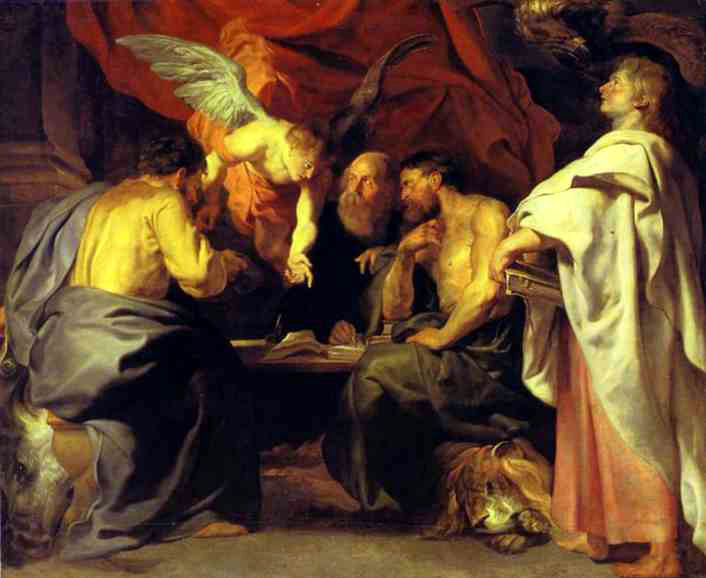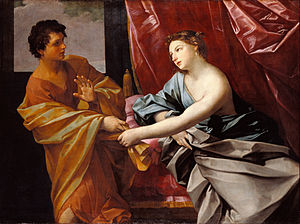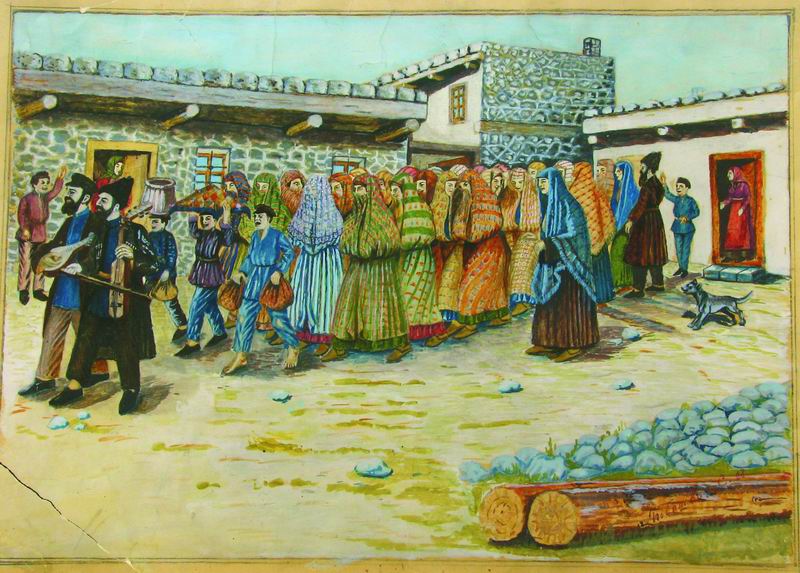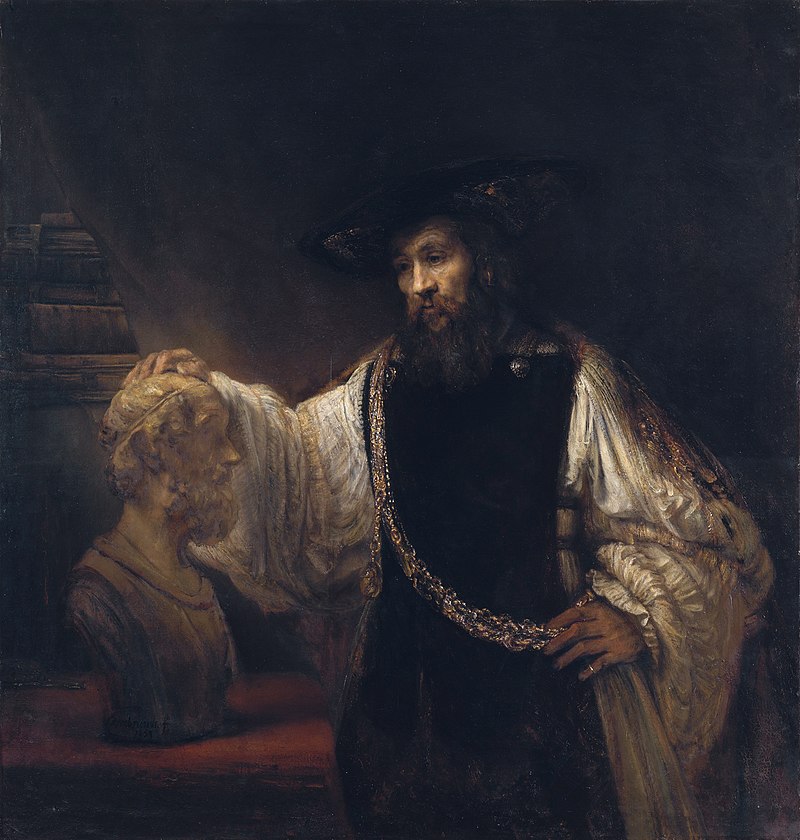
Luke, Matthew, Mark and John, each of whom did write a Gospel…
 As noted in earlier posts, my Lenten discipline is a formal contemplation – some deep profound thinking – about exactly how and when Moses put the first five books of the Bible – the Torah – into writing.
As noted in earlier posts, my Lenten discipline is a formal contemplation – some deep profound thinking – about exactly how and when Moses put the first five books of the Bible – the Torah – into writing.
One thing I’ve learned: Moses may have relied heavily on oral tradition.
It wasn’t until Moses’ lifetime that writing as we know it got used at all. (And then only among the “learned classes.”) And as late as 700 years after Jesus, even Charlemagne – lord and ruler of the Holy Roman Empire – couldn’t read or write.
And Moses lived a thousand years before Jesus. (And two millennia before Charlemagne.)
Another thing I learned: Moses may have gotten the “One God” idea from a Pharaoh who ruled 100 years before him. (That would be Akhenaten. Egyptians later called him the “heretic king” for messing with traditional Egyptian polytheism. See Moses, the Burning Bush, “et alia.”)
Of course you may find that a bit hard to swallow. (That Moses got “One God” from an Egyptian.)
But consider this new evidence from the Daily Office Readings for Saturday, February 27.
In Genesis 43:16-34, Moses continued the story of how the Hebrews came to be in Egypt. For starters, Joseph was the son of Jacob, whose name got changed to Israel by God. And basically, Joseph ended up in Egypt after being kidnapped and sold into slavery by his jealous brothers.
So Joseph ended up in Egypt as a slave, but that was a good thing. (As it turned out.)
 And aside from being a slave, Joseph also had to become pretty much a convicted felon. That is, he got “convicted” after Potiphar’s wife – seen at right – falsely accused him of rape. But then he ended up so well rehabilitated that Pharaoh made him his right-hand man. (Pharaoh seems to have given Joseph the functional equivalent of a pardon.)
And aside from being a slave, Joseph also had to become pretty much a convicted felon. That is, he got “convicted” after Potiphar’s wife – seen at right – falsely accused him of rape. But then he ended up so well rehabilitated that Pharaoh made him his right-hand man. (Pharaoh seems to have given Joseph the functional equivalent of a pardon.)
In the meantime, Joseph’s family back in Canaan was going through a devastating famine. So Jacob – alias “Israel” – sent most of his sons down to Egypt to negotiate for some food.
In turn, the reading for Saturday, February 27, had Joseph invite his brothers to dinner. Of course the kicker was that his brothers didn’t recognize the guy who invited them to dinner as their “dead brother.” (Joseph was “dressed as an Egyptian ruler,” and the the last thing the brothers expected was to “find the brother they had sold into slavery.”)
The point of all this: According to Genesis 43:32 the Hebrews were unclean to the Egyptians:
The waiters served Joseph at his own table, and his brothers were served at a separate table. The Egyptians who ate with Joseph sat at their own table, because Egyptians despise Hebrews and refuse to eat with them. (E.A.)
 According to the Pulpit Commentary, Egyptians couldn’t “break bread” with Hebrews, basically because they were ritually unclean. (The ritual painting at right is of “taking the bride to the bath house.”)
According to the Pulpit Commentary, Egyptians couldn’t “break bread” with Hebrews, basically because they were ritually unclean. (The ritual painting at right is of “taking the bride to the bath house.”)
In turn, the Hebrews – after Moses – went on to develop their own tradition of refusing to eat with, come in contact with, or even visit “Gentiles.” See for example Salvation of the Gentiles, Part 1:
A strict Jew wouldn’t allow himself to be a guest in a Gentile house, neither would he invite one to be a guest in his own home… The Jews viewed Gentiles as unclean, and that had great ramifications. For example, milk that was drawn from a cow by Gentile hands was not allowed to be consumed by Jews… No Jew would ever eat with a Gentile. (E.A.)
So it would seem that the Hebrews “borrowed” this idea of ritually unclean foreigners from the Egyptians. In turn it seems well within the realm of possibility that – in the same way – Moses borrowed the idea of “One God.” (From the “heretic” Egyptian king, Akhenaten.) But note that Moses did a much better job than Akhenaten. He literally changed history, in such a way that it can be said, “His burning bush still lights our world.” (Moses, the Burning Bush, “et alia.”)
But we were talking about about exactly how and when Moses put the first five books of the Bible into writing. And to that end, we were discussing the related topic of whether Jesus Himself personally “wrote” the four Gospels found in the New Testament.
Of course the short answer is No, Jesus didn’t personally write any of the Gospels.
In turn the fact that He left that task to His disciples – and/or followers – seems rarely to have been debated in history. (Of course one “atheist” answer is that Jesus didn’t write His own Gospel because He was, “as a Galilean peasant, most probably illiterate.”)
Then too, it seems to have been commo n practice back then for really smart people to have their students – and followers – take down what they said. For example, consider what Will Durant wrote about Aristotle, who lived from 384 to 322 “before Jesus.” (And so well after Moses):
n practice back then for really smart people to have their students – and followers – take down what they said. For example, consider what Will Durant wrote about Aristotle, who lived from 384 to 322 “before Jesus.” (And so well after Moses):
…it is possible that the writings attributed to Aristotle were not his, but were largely the compilations of students and followers who had embalmed the unadorned substance of his lectures in their notes… Even the unity of style that marks Aristotle’s writings, and offers an argument to those who defend his direct authorship, may be, after all, merely a unity given them through common editing… About this question there rages a sort of Homeric Question… We may at all events be sure that Aristotle is the spiritual author of all these books that bear his name: that the hand in some cases [may be] another’s hand, but that the head and heart are his. (E.A.)
In turn it could easily be said that Jesus “spiritually authored” the four Gospels. But might the same thing be said of Moses? Once again, there seems no certain answer.
“Boot camp” Christians say that of course Moses personally hand-wrote all first five books of the Bible. (See Don Stewart :: When Did Moses Write, or Compile, the Book.) Others point out various anachronisms and/or “chronological inconsistencies” that seem to prove otherwise. (See Why Moses Did Not Write the Torah – Mesa Community College.)
But couldn’t Moses too have had his own “students and followers,” just like Aristotle?
Those students and followers might well have “embalmed the unadorned substance” of Moses’ “lectures.” After all, what else was there to do on those long dark nights during 40 years of wandering in the wilderness? And those students and followers might well have numbered in their “hundreds, fifties and tens.” (Just like the other “leaders over groups” noted in Exodus 18:21.) And just what was Moses trying to do during those 40 long years?
Mainly Moses was trying to forge a disciplined army – from a bunch of former slaves – capable of bringing down the walls of Jericho, on the way to re-conquering the Promised Land.
(As alluded to in the Old Testament reading for the Fourth Sunday in Lent, Joshua 5:9-12.)
But we’re getting ahead of ourselves. And unfortunately we’ve gone beyond the ideal length of blog posts, meaning this Homeric Question will remain unresolved a while longer…
 Aristotle [contemplating] a bust of Homer, by Rembrandt…
Aristotle [contemplating] a bust of Homer, by Rembrandt…
* * * *
The upper image is courtesy of Four Evangelists – Wikipedia, the free encyclopedia. For the four listed in order of appearance, see Peter Paul Rubens: The Four Evangelists – Art and the Bible:
Rubens portrayed the four evangelists while working together on their texts. An angel helps them… Each gospel author can be identified by an attribute. The attributes were derived from the opening verses of the gospels. From left to right: Luke (bull), Matthew (man [angel]), Mark (lion), and John (eagle).
Re: “Boot-camp Christians.” There’s more on that concept at the end of these notes. See also 2d Timothy 2:3-4, where Paul wrote, “Join with me in suffering, like a good soldier of Christ Jesus.”
 Also re: “buck private.” See Buck Privates – Wikipedia, on the “1941 comedy/World War II film that turned Bud Abbott and Lou Costello into bona fide movie stars.” (A poster for which is seen at right.)
Also re: “buck private.” See Buck Privates – Wikipedia, on the “1941 comedy/World War II film that turned Bud Abbott and Lou Costello into bona fide movie stars.” (A poster for which is seen at right.)
The image of Potiphar’s wife and Joseph is courtesy of Potiphar – Wikipedia, captioned: “Joseph and Potiphar’s Wife, by Guido Reni 1630.”
On Joseph becoming “Israel.” See On arguing with God.
Re: brothers not recognizing. See Why didn’t Joseph’s brothers … Answers.
Re: Egyptians refusing to eat with Hebrews. See the full Pulpit Commentary on Genesis 43:32:
Because the Egyptians might not eat bread with the Hebrews. Herodotus (2:41) affirms that the Egyptians would neither use the knife, spit, or basin of a Grecian, nor taste the flesh of a clean cow if it happened to be cut with a Grecian knife. For that is an abomination unto the Egyptians. The reason for this separation from foreigners being that they dreaded being polluted by such as killed and ate cows, which animals were held in high veneration in Egypt.
The Durant quote on Aristotle is from The Story of Philosophy: The lives and opinions of the world’s greatest philosophers from Plato to John Dewey. Specifically, from the 1953, Washington Square Press “Pocket Books” edition, at page 57, from Chapter II, “Aristotle and Greek Science,” sub-section II, “The Work of Aristotle.”
Note also that – strictly speaking – a Homeric Question “concerns the doubts and consequent debate over the identity of Homer, the authorship of the Iliad and Odyssey, and their historicity…”
The lower image is courtesy of Aristotle – Wikipedia.